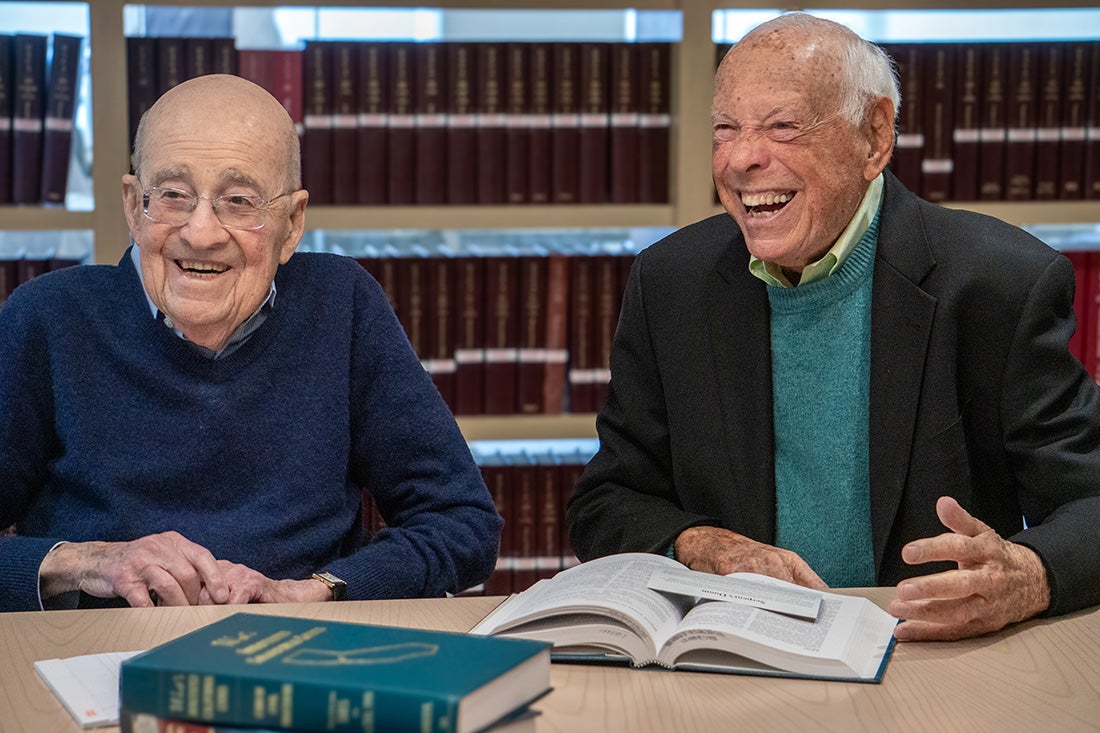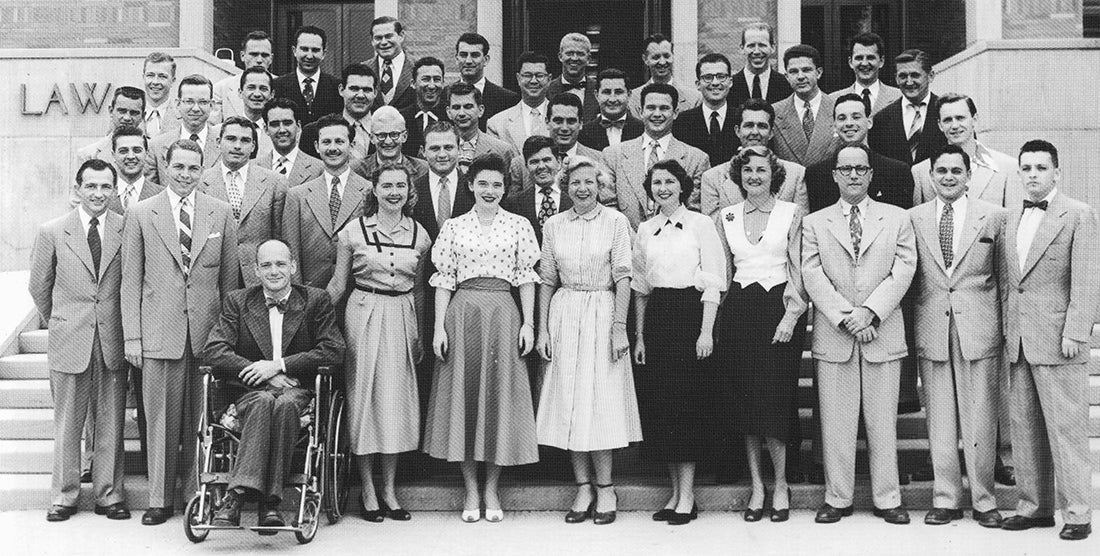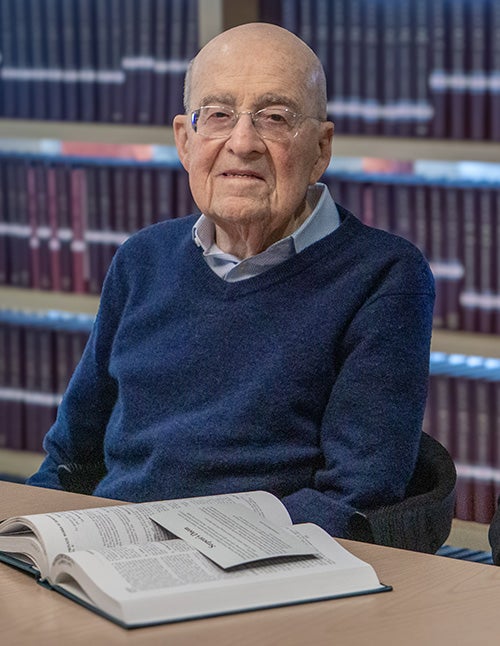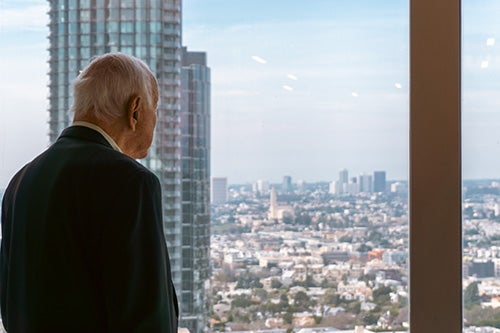The Pioneers
UCLA Law Magazine | Summer 2025 | Volume 47
Arthur Greenberg and Joseph Tilem, members of UCLA Law’s very first class, look back on their time in law school and extraordinary careers.
For Arthur Greenberg ’52, law school was a defining experience. “UCLA Law made my life,” said the 97-year-old alumnus. And what a life it has been for this member of the first class at the brand-new UCLA School of Law in 1949. Today, his firm, Greenberg Glusker, includes 120 attorneys and is the largest single-office, full-service law firm in California. “My name is on the wall first in line,” he said with a smile. He still goes to the office daily, where he is accessible and inspiring to younger members of the firm.
Greenberg’s law practice, which he began as a $200-a-month law clerk right out of school, has provided him “a complete professional life and an intellectual, emotional, and personal challenge beyond my highest expectations.”
Meanwhile, his classmate, Joseph Tilem ’52, said, “All of my activities of my entire life I credit to UCLA.” Tilem’s trajectory was different from Greenberg’s, as he served as attorney for the world’s first full-service credit card companies, as well as being elected mayor of the city of Beverly Hills.
“I was there at the founding of the whole credit card industry,” he said. “Back then, no one even knew what they were. And it was fun being mayor — a whole different kind of experience.”

A law school at its start
Tilem, now 98, was a UCLA undergrad when he heard that a law school was opening. He walked across campus and found someone taking the names of those wanting to be considered for admission. “I put my name down and later was pleased to learn I was accepted,” he said.
Greenberg wanted to go to law school at Stanford, where he had spent his undergraduate freshman year before transferring to UCLA, but his parents wanted him to stay close to home. Although his family lived near USC, Greenberg chose UCLA Law.
Watch "A Conversation with UCLA Law's Inaugural Class" and join Dean Michael Waterstone as he sits down with Arthur Greenberg and Joseph Tilem, alumni from UCLA Law's historic first graduating class of 1952. In this conversation, Arthur and Joe both share their memories of early campus life, reflect on their distinguished careers, and discuss how their UCLA Law education shaped their professional journeys.
Both men — two of the last living members of UCLA Law’s very first class — had vivid memories of the school’s early days. “For two years, we had classes in barracks — like the ones I slept in the army — behind Royce Hall,” Greenberg recalled.
Tilem chimed in: “Yeah, there was a room where we could spend spare time, and a few of us would occasionally play cards there, with nickels, dimes, and quarters. But it all came to a halt when Dean Coffman came through, giving a tour to deans from other law schools. We were chastised, and the next day, an edict went out: ‘No card playing.’”
The two remembered the school’s first dean, L. Dale Coffman, as “running a tight ship.” He was “tough, not particularly friendly,” Greenberg said.
In a class of 49 men and five women, the top two students were female. It was, Tilem noted, “the great irony.”
Classes met six days a week at 8 a.m. The men agreed that there was no time for a social life; they were “glued to the books.” They took notes in class “furiously” and typed them up at night. “You’d summarize the lecture into 10 lines on a tissue paper that was gummed on one side, and stick it into a notebook,” Tilem said.
The construction of a building was a major milestone for the new school. Both men remember watching it go up “brick by brick.” When it opened, “it was kind of shocking to walk into it,” Tilem said. “Some of the doors didn’t open properly. There were a lot of little things that still needed work. It had an enormous library, and I got a job there, putting books on the shelves for $1 an hour.”

“Don’t focus too narrowly on one thing, because something is going to come in from left field. It’ll change your life. It did mine.”
Their careers take flight

After graduating, Greenberg joined a firm in down- town Los Angeles at a salary of $400 a month. His partners were specialized, focused only on certain types of cases, so he tried to handle everything else — “whatever walked through the door.”
In questioning prospective jurors for his first case, he knew he wasn’t supposed to ask a woman if she was married. “So I said, ‘Mrs. Smith, is there a Mr. Smith?’ She answered, ‘Yes, there are many.’”
In 1959, he joined attorneys Philip Glusker and Irving Hill in forming Greenberg Glusker above a Safeway store on Wilshire Boulevard. Hill, the most experienced of the three, charged $30 an hour; Glusker and Greenberg, $25. Today, the firm— now in Century City — charges $1,000 an hour.
As for Tilem, in his second year of law school, he was hired as a law clerk at a firm on South Beverly Drive, for 90 cents an hour. “I really just filled the paper machine and cleaned up in the office,” he said. “When I passed the bar, they raised me to a dollar an hour.”

But his fortunes changed when he got a call from one of the firm’s clients, Alfred Bloomingdale, owner of Diner’s Club, which created the world’s first multipurpose credit card. Bloomingdale invited Tilem to work for him for $600 a month. “I felt it might be disloyal to leave the firm with a client, so I called my father for advice. But I couldn’t forgo the salary, and I was at Diner’s Club from 1954 to 1960.”
Then, when Hilton Hotels started a credit card company, Barron Hilton hired Tilem as vice president. In that role, he traveled to South America, Europe, and the Middle East, trying to get banks to accept the Hilton card.
Next, Tilem started his own law firm, which grew to 11 members. He started another new chapter when he was elected mayor of Beverly Hills. He recalled, “Being mayor was like taking a postgraduate college education in dealing with street lighting, union negotiations, what kind of trees you’re allowed to plant in a city, and a whole range of human activities that you would never encounter in any other way except when you’re in the hot seat at city hall.”
Tilem and Greenberg reconnected occasionally over the years. Notably, they crossed paths when Greenberg Glusker handled the savings and loan crisis in L.A., which Greenberg remembered as a “very bitter, tough experience.” Tilem, who at the time was on the board of a failing savings bank, remembers being deposed by Greenberg. “I was scared,” he admitted. “It’s very different when you’re being deposed rather than taking the deposition.”
UCLA Law’s lasting impact
“Arthur and I went in very different directions,” Tilem said, “but the nucleus of our life experience has been based on what we did in law school. Sometimes, years later, a case you had in school applies to what you’re doing.”
He said UCLA Law taught him the importance of working together by partnering him with a classmate to study for the bar exam. “That taught me the need for talking with your colleagues,” he said. “As a result, later in my law practice, I had no problem walking into my partner’s office to discuss a case.”
Asked what advice he’d give to graduating students today, Tilem said: “Keep your options open. So much of it is serendipity. You never can tell when opportunity is going to arise. Don’t focus too narrowly on one thing, because something is going to come in from left field. It’ll change your life. It did mine.”
Greenberg advised: “Be careful in choosing where to practice law. Some firms are better than others in how they treat people. That’s a serious issue. But the law practice to me was exciting, interesting, profitable, and happy.”
Read more in the 75th Anniversary edition of the UCLA Law magazine.
Celebrating 75 Years of UCLA Law
Join the dean of UCLA School of Law, Michael Waterstone, UCLA Chancellor Julio Frenk, and distinguished faculty, students, and alumni as we celebrate 75 years of UCLA Law. This video tribute honors our history of legal innovation and vision for shaping tomorrow's legal landscape. From groundbreaking scholarship to producing leaders who have transformed the practice of law, UCLA Law continues its tradition of excellence while looking boldly toward the future.